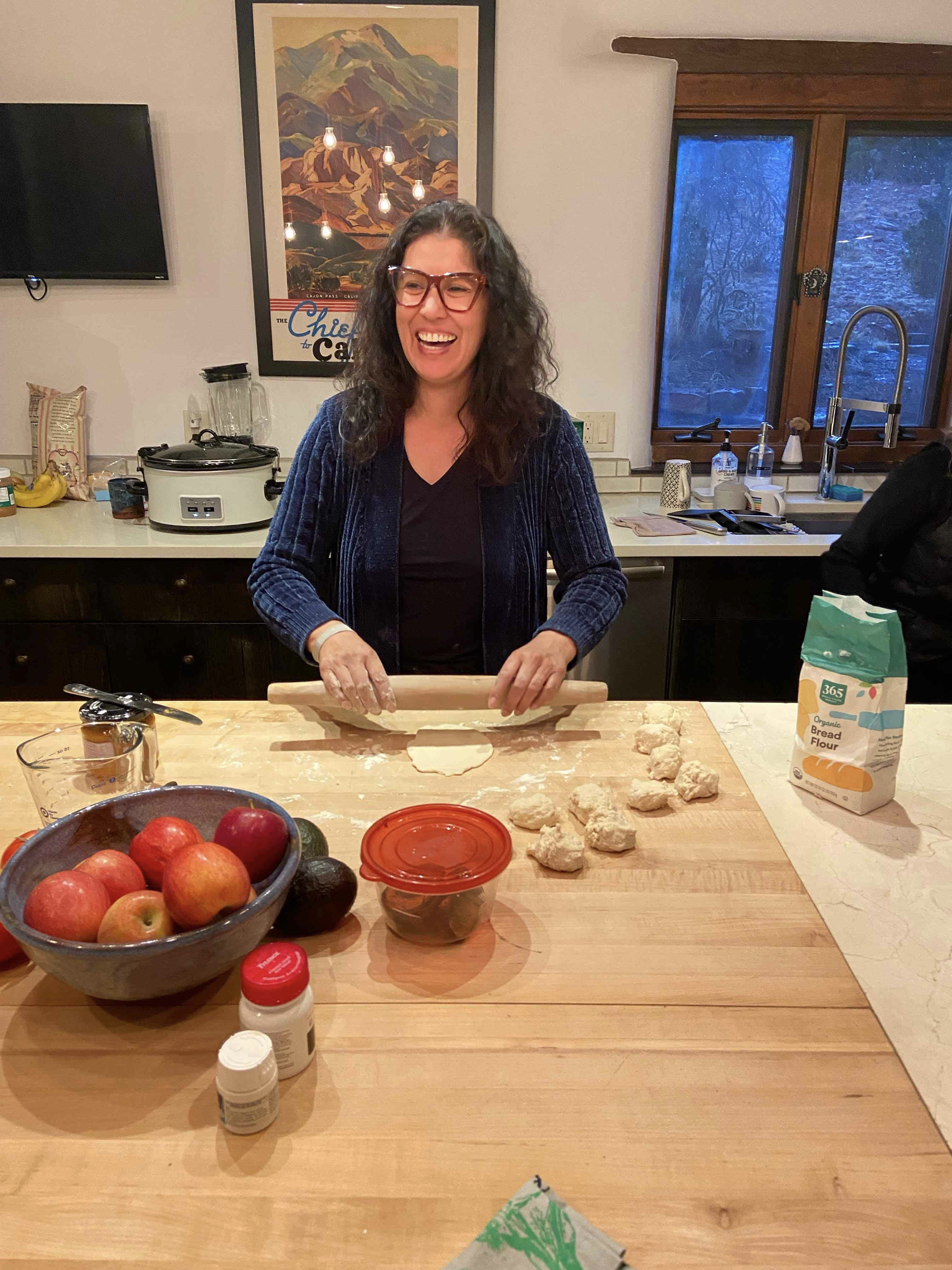I still remember the days I would substitute teach and step into the school cafeteria. What I saw was disheartening—teenagers eating ultra-processed peanut butter and jelly sandwiches made with squished, lifeless bread. Those so-called sandwiches were far from the wholesome food we imagine when we think of a simple PB&J. The bread alone was loaded with additives we would never find in our own kitchens. I couldn’t help but think of the disconnect between the food we feed our children and the healthy futures we envision for them.
This story sticks with me because it highlights something fundamental about our food system: the widespread reliance on ultra-processed foods. Currently, anywhere from 60 to 80% of our calorie intake is derived from these foods, and for young people, the number is often even higher. This isn’t just about what we eat—it’s about what this type of food does to our bodies, our communities, and our planet. And it’s why I’m here, writing to you today, as a fellow kitchen activist.
The difference between processed and ultra-processed foods is an important one, and it’s intentionally muddled by the food industry. Take, for example, a simple pot of beans. When I cook dried beans and turn them into a meal, that’s processed food—but it’s nourishing and full of life for our bodies. Ultra-processed foods, on the other hand, are filled with things like high-fructose corn syrup, modified starches, and hydrogenated oils. These are ingredients you’d never find in a regular kitchen. And these ultra-processed foods? They’re linked to cancer, gut microbiome destruction, and a host of environmental issues, from water pollution to greenhouse gas emissions.
The connection between our gut health and the health of the planet is striking. Just as healthy, microbiology-rich soil produces more nutritious food and requires less water, a healthy gut full of good bacteria keeps us thriving. Ultra-processed foods strip away this microbiology, both in our soil and in our bodies. The industrialized food system, with its reliance on petroleum-based chemicals and extractive practices, is not only making us sick but is also wreaking havoc on the environment. Yet, companies continue to market these foods under the guise of convenience and reduced food waste, leaving consumers confused about what’s truly sustainable.
Take, for example, the claim that ultra-processed foods reduce food waste because they have longer shelf lives. At first glance, this might seem like a good thing. But the reality is that the production of these foods uses far more water and energy, and relies on harmful agricultural methods. The environmental cost far outweighs any perceived benefit. Real solutions, like building a food system aligned with nature and human health, require us to rethink how we eat and what we bring into our kitchens.
As kitchen activists, we have the power to change this narrative. By paying attention to what we eat and how it’s produced, we can take small, actionable steps that make a big difference. Here are some steps you can start with:
- Read Labels Intentionally: When shopping, focus on simplicity. If an ingredient list includes things you wouldn’t normally find in your kitchen—like de-foaming agents or artificial colorings—it’s a sign to leave that product on the shelf. The fewer ingredients, the better.
- Choose Organic When Possible: While not all organic foods are free from ultra-processing, organic products generally have fewer synthetic additives. This can be an effective way to minimize ultra-processed foods in your diet. However, be mindful that the organic label isn’t perfect—it’s still important to scrutinize what you buy.
- Eat More Whole Foods and Plants: Incorporating more fruits, vegetables, and whole foods into your diet not only nourishes your body but also reduces reliance on packaged, ultra-processed options. Instead of reaching for chips, try a handful of grapes or a slice of melon. Seasonal fruits and vegetables from your local farmers’ market are an excellent place to start.

The cost of eating real, whole foods is another topic that deserves attention. Many argue that ultra-processed foods are cheaper and more accessible. But when you break it down, the price difference isn’t always significant. For example, I once calculated the cost of making a homemade, organic beef lasagna versus buying a family-sized, ultra-processed lasagna from the freezer section of a major retailer. The homemade version cost about $30, while the store-bought one cost $28.60. For a mere $1.40 difference, the homemade option was far healthier and better for the planet. The notion that real food is prohibitively expensive is a myth we need to challenge.
Ultimately, the choices we make in our kitchens ripple out into the world. Cooking at home, being mindful of ingredients, and choosing foods that align with nature are all powerful acts of activism. These are small changes, but they add up to meaningful impact—not just for our own health, but for the health of the planet.
Thank you for joining me on this journey to become a kitchen activist. I’d love to hear what you’re doing in your own kitchen and how we can work together to create change.
If you enjoyed this post, please consider reviewing my book, Eat Less Water, or sharing this blog. Together, we can amplify the message and inspire more kitchen activists.
Link to The Kitchen Activist Podcast episode this blog was based on: https://www.buzzsprout.com/1997290/episodes/13719926-the-shocking-truth-about-ultra-processed-foods-and-how-you-can-fight-back-from-your-kitchen
Link to purchase a copy of my award winning book Eat Less Water: https://www.florenciaramirez.com/book/

click to Read & Leave a comment
Click to close comments
Comments